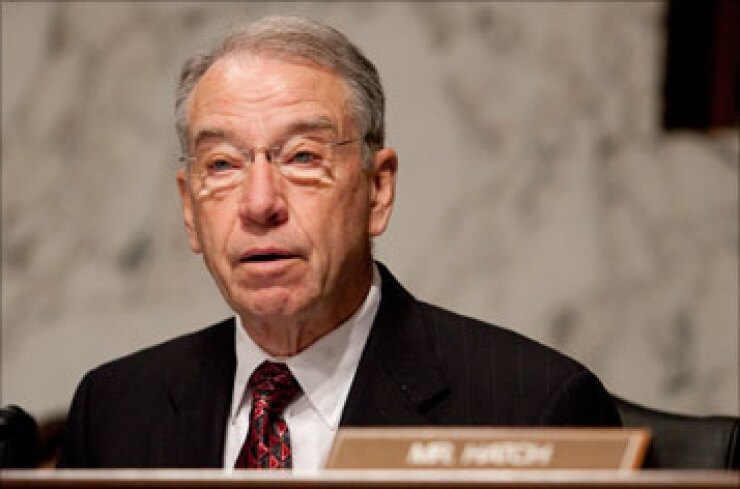Lawmakers introduced two bills Thursday in the Senate that would affect the Child Tax Credit and the Lifetime Learning Credit, and marijuana taxes.
Sen. Chuck Grassley, R-Iowa, a former chair and current senior member of the Senate Finance Committee, introduced the Family and Community Inflation Relief Act, that aims to help parents cope with soaring inflation by adjusting the Child Tax Credit and the Non-Child Dependent Credit’s phaseout thresholds and credit amounts for inflation.
The bill would also provide relief for college students and their parents by adjusting for inflation existing education-related tax benefits, including the American Opportunity Tax Credit, the Lifetime Learning Credit and the student loan interest deduction. However, to prevent adding to the deficit, the bill includes an extension of the current cap on the state and local tax deduction to pay for the inflation relief.
That would likely make the bill unpalatable to Democrats who have been eager to repeal the $10,0000 cap on the SALT deduction that was ushered in by Republicans in 2017 with the Tax Cuts and Jobs Act. That provision is due to expire in 2025, along with a host of other individual tax provisions.

Last month, Grassley introduced another piece of legislation, the Middle-Class Savings and Investment Act, which aims to provide targeted tax relief to lower and middle-income Americans to help shore up savings accounts. That bill would enable taxpayers to exclude some of their interest income from being subject to tax ($600 for married couples, $300 for individuals). It would also more than double the size of the lowest tax bracket for long-term capital gains and qualified dividends, and index the income thresholds to inflation. In addition the bill would eliminate the so-called “marriage penalty” that in the current Net Investment Tax subjects some income to an additional 3.8% tax — and indexing its income threshold to inflation; and increase the maximum “savers credit” an individual may receive for contributing to qualified retirement accounts and expanding the availability of this credit to more taxpayers. However, it too would pay for those tax breaks by extending the SALT cap, in this case for another three years.
Grassley sees the bill as helping families deal with surging inflation. The Consumer Price Index reached 9.1% in June, the highest level since November 1981.
“The relentless 40-year high inflation we’re seeing today has made it increasingly difficult for Americans to afford their trips to the gas station and grocery store,” Grassley said in a statement. “Coupled with my Middle-Class Savings and Investment Act, indexing useful tax credits to inflation — like the Child Tax Credit and the Lifetime Learning Credit — will help parents and students keep up with rising costs.”
Cannabis legislation
Senate Democrats also introduced a tax-related bill on Thursday, although it is more about cannabis legalization. The Cannabis Administration and Opportunity Act would end the federal prohibition on cannabis by removing it from the federal list of controlled substances and empowering states to implement their own cannabis laws. The bill was introduced by Senate Majority Leader Chuck Schumer, D-New York, Senate Finance Committee Chairman Ron Wyden, D-Oregon, and Sen. Cory Booker, D-New Jersey. Sens. Patty Murray, D-Washington and Gary Peters, D-Michigan, co-sponsored the legislation.
On the tax side, the bill would regulate and tax cannabis by transferring federal jurisdiction over cannabis from the Drug Enforcement Agency to the Food and Drug Administration and the Treasury Department’s Alcohol and Tobacco Tax and Trade Bureau, and implement a regulatory regime similar to alcohol and tobacco, while recognizing the unique nature of cannabis products. It would also eliminate the Tax Code’s restriction on cannabis businesses claiming deductions for business expenses and implement an excise tax on cannabis products.
“For far too long, the federal prohibition on cannabis and the War on Drugs has been a war on people, and particularly people of color,” Schumer said in a statement. “The Cannabis Administration and Opportunity Act will be a catalyst for change by removing cannabis from the federal list of controlled substances, protecting public health and safety, and expunging the criminal records of those with low-level cannabis offenses, providing millions with a new lease on life. A majority of Americans now support legalizing cannabis, and Congress must act by working to end decades of over-criminalization. It is time to end the federal prohibition on cannabis.”
Like the Grassley bill, the prospects for passing the cannabis bill are unlikely given the current impasse in the evenly divided Senate, where bills that have support from only one party have little chance of getting passed.





